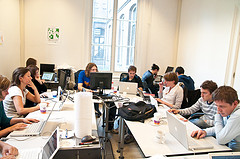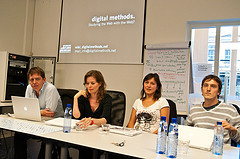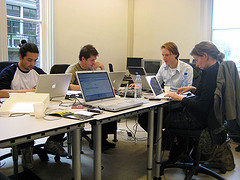The Digital Methods Initiative - About Us



The Digital Methods Initiative (DMI) is one of Europe's leading Internet Studies research groups. Comprised of new media researchers and PhD candidates, it designs methods and tools for repurposing online devices and platforms (such as Twitter, Facebook and Google) for research into social and political issues. With founding support from the Mondriaan Foundation, DMI has participated in a variety of funded research projects such as MACOSPOL (Mapping Controversies on Science for Politics) and EMAPS (Electronic Maps to Assist Public Science), the EU FP6 and FP7 projects led by Bruno Latour as well as Contropedia in the EU EINS scheme. Most recently, DMI is participating in ODYCCEUS, the H2020 project concerning opinion dynamics and cultural conflict in European spaces, CLEOPATRA, the H2020 project on cross-lingual event analysis as well as SoBigData++, the big data research infrastructure. The Digital Methods Initiative, together with the Govcom.org Foundation, have received grants from the Soros Foundation, Open Society Institute, Open Society Foundations, Ford Foundation, MacArthur Foundation, New Venture Fund and have worked as partners in projects funded by the National Science Foundation (U.S.) and the Netherlands Organisation for Scientific Research. Its IssueCrawler software has been supported by nearly 100 universities as well as non-governmental organisations. Other well-known software tools include the Lippmannian Device, Netvizz (Facebook analysis), DMI-TCAT (Twitter analysis) and 4CAT, the toolset for social media analysis, especially the deep vernacular web.
Here is an interview about the history of the Digital Methods Initiative (2014) by Michele Mauri, DensityDesign Lab, Milan, speaking with Richard Rogers, the director. Here is one in Spanish, El Discurso del Método Digital (2016). An interview by Sarah Lewthwaite in the Chilean design journal, Diseña, is here (2019). And here is a promo video about the Digital Methods Summer School (2014) and one Lisa Maier made about the Summer School in 2015 (tip!)
Our work has been featured in the New York Times and on CNN as well as NBC News.
DMI projects include:
- Ongoing collaborations with the Open Intelligence Lab, App Studies Initiative and the Public Data Lab (2020-).
- Participation in 'Radicalization by Design', on social media rabbit holes, Impakt festival, Utrecht (2020).
- A cross-platform analylsis of misinformation in the lead-up to the US presidential elections (2020).
- A study of 'fake news' (pdf) in the Netherlands for the Ministry of Internal Affairs (2019), entitled 'The Politics of Social Media Manipulation'. News article. Open access book.
- A series of ongoing projects about Trump, fake news and the meme wars (2017)
- Mapping Iran Online, 2012-2013
- Right-wing Formations in Europe and their Counter-measures, 2013
- Climaps: A Global Issue Atlas of Climate Change Adaptation, 2013-2015
- Issue Mapping for an Ageing Europe, 2013-2015
- First Draft
- Greenpeace International
- Human Rights Watch
- Amnesty International
- De Correspondent
- NRC Handelsblad
- Association for Progressive Communications
- Women on Waves
- Carbon Trade Watch
- Corporate Observatory Europe
- Fair Phone
- Open Knowledge Foundation
- Hivos
- Pauw en Witteman, VARA (Dutch talk show)
- Sacom
- DVRC
- Links, likes and other natively digital objects
- Websites as archived objects
- Engine critique and search as research
- Cross-spherical analysis as comparative media studies
- National web studies
- Wikipedia as cultural reference
- Social media data, post-demographics and platform studies
- Digital methods for issue mapping
- Digital methods theory
- Visual media analysis
- Alt-tech network mapping
Field Guide to Online Trackers. Entry to the Crypto Design Award challenge, Museum of the Image, Breda, 2015.
Contact
Email: info [at] digitalmethods.net Postal address:Digital Methods Initiative
Mediastudies
University of Amsterdam
Turfdraagsterpad 9
1012 XT Amsterdam
the Netherlands
Academic Collaborations
The Digital Methods Initiative is collaborating in one form or another with the following organizations:- Barcelona Media, Barcelona, Spain
- Centre for the Study of Invention & Social Process, Goldsmiths College, University of London, UK
- Chinese University of Hong Kong
- Citizen Lab, University of Toronto, Canada
- Density Design, Milan, Italy
- Infoscape Research Lab, Ryerson, Canada
- Institute of Network Cultures, Amsterdam, the Netherlands
- Iran Media Program, Center for Global Communication Studies, Annenberg School for Communication at the University of Pennsylvania, USA
- King's College London, UK
- Media Lab, Sciences Po, Paris, France
- Medialab, Amsterdam University of Applied Sciences, Amsterdam, the Netherlands
- Politiek Online, The Hague, the Netherlands
- University of Lille
- University of Wisconsin-Milwaukee's Center for 21st Century Studies, Milwaukee, Wisconsin, USA
- Yahoo! Research, Barcelona, Spain
Digital Methods Courses
There are Digital Methods related courses being given at the following institutions:- University of Amsterdam
- University of Bergen
- Central European University, Budapest
- University of Copenhagen
- Goldsmiths College, University of London
- King's College London
- London School of Economics
- University of Milan
- Politecnico di Milano
- Politecnico di Torino
- Sciences Po Paris
- University of Warwick
People
Please see the DMI People page| I | Attachment | Action | Size | Date | Who | Comment |
|---|---|---|---|---|---|---|
| |
DMI_Poster_2013.pdf | manage | 1 MB | 15 Apr 2013 - 20:26 | AnneHelmond | |
| |
DMI_Poster_2013_medium.jpg | manage | 402 K | 15 Apr 2013 - 20:39 | AnneHelmond | |
| |
Summer_School_2015.jpg | manage | 402 K | 06 Oct 2015 - 19:24 | RichardRogers | Digital Methods Summer School 2015 group photo |
| |
trackers2.jpg | manage | 62 K | 02 Oct 2015 - 11:47 | RichardRogers | |
| |
trackers3.jpg | manage | 18 K | 02 Oct 2015 - 11:49 | RichardRogers | |
| |
trackers4.jpg | manage | 20 K | 02 Oct 2015 - 11:50 | RichardRogers |
Edit | Attach | Print version | History: r68 < r67 < r66 < r65 | Backlinks | View wiki text | Edit wiki text | More topic actions
Topic revision: r68 - 25 Mar 2021, RichardRogers
 Copyright © by the contributing authors. All material on this collaboration platform is the property of the contributing authors.
Copyright © by the contributing authors. All material on this collaboration platform is the property of the contributing authors. Ideas, requests, problems regarding Foswiki? Send feedback


